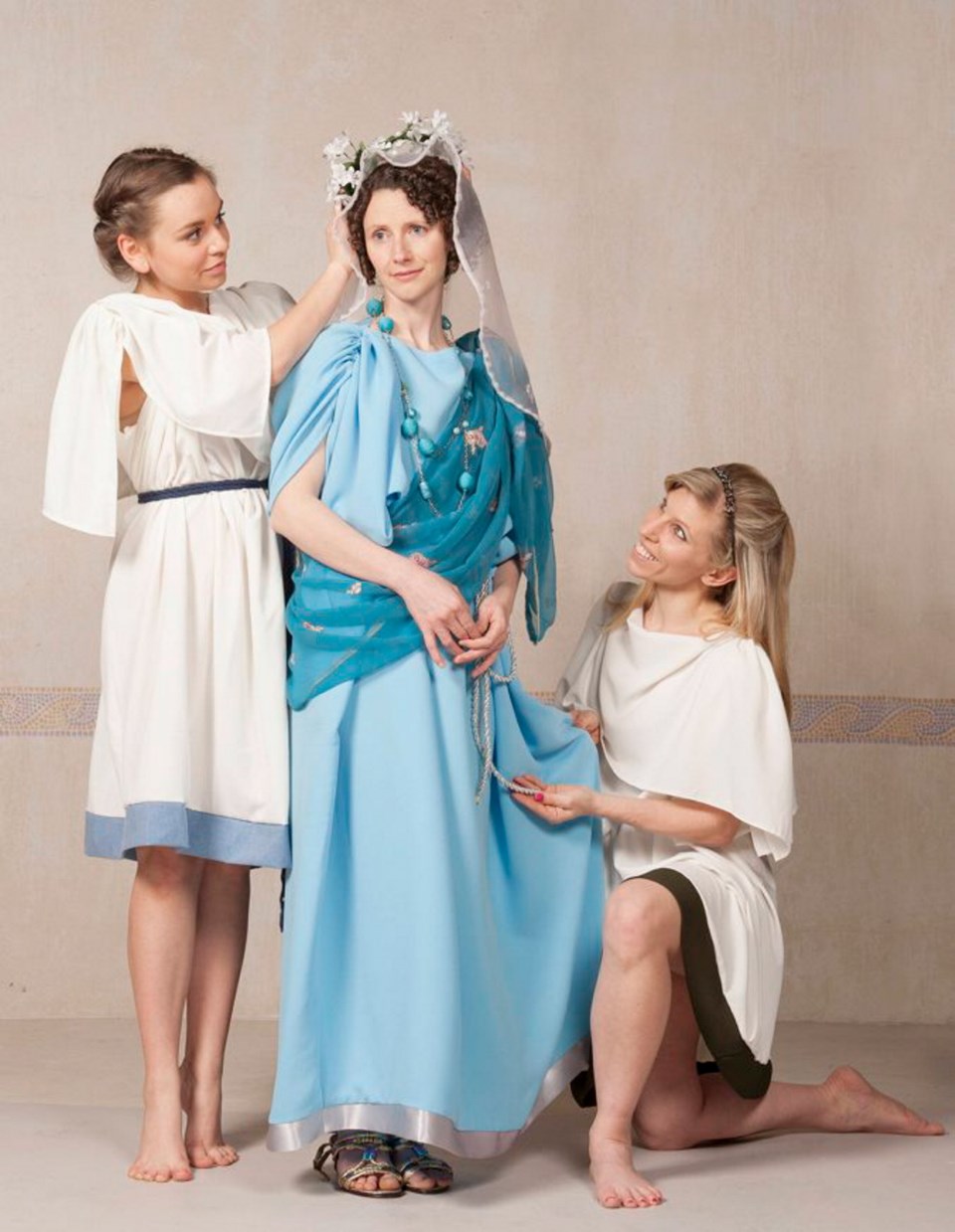Review
The Penelopiad
Where: Langham Court Theatre
When: Until May 10
Tickets: $19-$21
Reservations: 250-384-2142
Rating: three and a half stars (out of five)
For someone without much of an appetite for Greek mythology with few exceptions — savouring Scottish comedian Craig Ferguson’s irreverent riffs on Helen of Troy, for instance — the prospect of watching The Penelopiad was about as enticing as having to endure a public forum on local sewage issues.
Indeed, sitting through Margaret Atwood’s feminist spin on Homer’s epic poem seemed like a penance — a surefire way to spark an exodus from purgatory.
It’s a measure of just how captivating director Wendy Merk’s production that opened Thursday at Langham Court Theatre is that any such feelings of dread soon evaporated.
The spell was cast not long after an ethereal Jackie Rioux made her grand entrance in Hades amid a dramatic cloud of white smoke as Penelope of Sparta, setting the tone for this playful, briskly paced take on the Greek classic by deadpanning: “Now that I’m dead, I know everything.”
While Atwood’s sly, sardonic retelling of the Odysseus myth is from Penelope’s perspective, The Penelopiad is also a terrific ensemble piece. Its impressive all-female cast of 15 assumes multiple roles, including Penelope’s hanged 12 handmaidens and revolting suitors who set their sights on Penelope when her husband, the wily king Odysseus of Ithaca, spends 10 years fighting the Trojan war and another decade making his way home, is presumed dead.
Irony abounds as Penelope’s life story is told from the ancient Greek underworld, with digital title cards introducing each episode — Penelope Gets an Idea, Helen Ruins Penelope’s Life, and so on. Modern flourishes also begin to mount alongside the classical references, from an amusing nod to the Chariots of Fire theme that plays during an early foot race, to Emily Yarnold’s amusingly cheeky portrayal of über-vain Helen of Troy (“Divine beauty is such a burden,” she sighs). It’s not a stretch to say Yarnold’s modern take brings Mean Girls to mind more than Homer.
Under Merk’s sure-handed direction, the action fluidly unfolds. It alternates between bright and airy sequences and the more horrifying developments in Act 2, that include a brief rape sequence and a stylishly rendered lamb slaughter — one of two sequences in which some wonderfully theatrical masks are used to good effect.
Rioux’s richly textured performance as the curly-haired heroine whose grace, humour and intelligence barely masks the pain of her story’s underlyling tragedy, is nicely offset by a cast of expressive women young and old who are clearly up to this show’s challenges.
Other standouts include Kathy Macovichuk, astonishingly manly and self-confident as Odysseus; Gloria Snider, whose physicality, switches between comedic flourishes and more venomous aspects of her portrayal of the envious, aged slave Eurycleia recalls Dorothy Loudon; and Amelia Petscheleit as Telemachus, the posturing, rebellious son who reluctantly obeys his vengeful father Odysseus’s orders.
Taryn Lees is also captivating as an undulating Naiad; as is Langham Court veteran Pippa Catling, flitting about and dashing off bon mots like Maggie Smith while playing Queen Anticleia and Oracle.
The production uses some very clever stagecraft that includes ropes, lengths of white chiffon and blood-red feather boas in a Hades sequence. As well, a swath of blue cloth manipulated to replicate a stream where baby Penelope almost drowns, and red-and-white fabric, cleverly employed in a sailboat sequence makes The Penelopiad a feast for the eyes, even if it overstays its welcome at nearly 21Ú2 hours.
Other assets include Sylvia Hosie’s clever choreography, beneficial without being obtrusive; Merk’s serviceable Grecian pearl-coloured set featuring hieroglyph-like drawings, Greek lettering and a stage with two small staircases; Ann-Marie Arneson’s striking costumes and Anastasia Schwarze’s atmospheric lighting.
The show’s striking production design isn’t so over-the-top it distracts from the language, particularly the amusing gender mockery that includes references to Odysseus’s apparent shortcomings; the amusing contempt his long-suffering wife has for “that septic bitch” Helen of Troy; or the conceit that casts the ill-fated maids as Penelope’s conspirators.
Pre-recorded music played on both orchestral and from ancient Greek instruments such as the lute, lyre and pan pipes composed by Ivana Jokic and Liam Gibson enhance the varying moods of the piece. On the downside, while Atwood’s desire to have the palace maids function as a singing Greek chorus is understandable, this engaging but slightly flabby production would surely have benefited by pruning or losing some of these songs.
